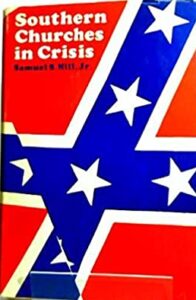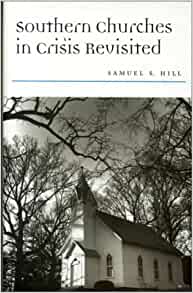In Memoriam
[Editor's note: I would like to thank Alison Greene, Luke Harlow, and Randall Stephens for feedback on an early version of this memoriam and, in the case of Stephens, the sections on Sam Hill’s early life and scholarship.]
Samuel Smythe Hill, Jr. born in Richmond, VA, October 25, 1927, died June 1, 2021. Sam served as a pastor in Burlington, Kentucky before earning his Ph.D. in Religion from Duke University in 1960. He went on to positions at Stetson University and the University of North Carolina, Chapel Hill. He took up a post as chair of the University of Florida Religion Department in 1972 and continued as a professor at UF until he retired in 1994. Sam Hill is survived by his wife Helen S. Hill, and his children, Sarah and Charles.
Known as the “dean of southern religious history,” Hill laid the cornerstone for the study of religious history in the American South with the publication of Southern Churches in Crisis (1966). Among his many works were Religion and the Solid South (1972); The South and the North in American Religion (1980); The New Religious Political Right in America, with Dennis E. Owen (1982); Religion in the Southern States: A Historical Study(1983); On Jordan's Stormy Banks: Religion in the South (1983); Encyclopedia of Religion in the South, ed. (1984); Handbook of Denominations in the United States, with Frank S. Mead (1985); Varieties of Southern Religious Experience (1988); One Name but Several Faces: Variety in Popular Christian Denominations in Southern History (1996); and The New Encyclopedia of Southern Culture: Religion, ed. (2006). Hill distinguished himself as both a scholar and a teacher. He was named the Teacher of the Year by the College of Liberal Arts and Sciences at the University of Florida in 1982-83.
Hill’s most well-known and influential work

Original hardback cover of Southern Church in Crisis (1966)
was Southern Churches in Crisis (1966). According to him, white Protestantism, particularly Southern Baptists, in the South were disengaged from the pressing issues of the day and lacked a critical social ethic. Hill wrote the book in an era of civil rights marches, demonstrations, and sit-ins. In Newsweek in 1967 Kenneth Woodward wrote that, “the core of Hill’s carefully spun-out criticism is theological. Southern fundamentalism, the 39-year-old professor charges, is not fundamental enough, its concentration on man’s need for individual forgiveness by a righteous God reduces the full Christian message to ‘a relatively short catalogue’ of selected doctrines, according to Hill; and in the hands of Southern preachers this selectivity ‘often amounts to manipulation’ of the Bible itself.” In the Chicago Tribune in that same year Harold Blake Walker noted that the book “was written by a southern Baptist who cares for the church. It is a sensitive and perceptive appraisal of the southern church, written in a readable style and with a prophetic vision.” As a scholar forging a new form of criticism about Protestant churches, he did not see the work as final word on the subject.
Hill was an eager observer of scholarship in the field and encouraged young scholars to press forward with the study of southern religion. John Lee Eighmy’s Churches in Cultural Captivity (1972) showed the reach of his thinking about the region and American Protestantism. Eighmy framed the “captivity thesis,” or that white Protestants were held captive by socially conservative political views, within the thinking of Hill’s project on white southern Protestants. When Eighmy died unexpectedly before publication, Hill wrote the “Introduction” and “Conclusion.” In important ways, however, Eighmy had shown the flaw in the captivity thesis by exposing Southern Baptists’ willingness to engage politics in everything but civil rights. Hill had argued a kind of inevitability thesis: white Protestant churches in the American South could not have acted any other way in terms of the civil rights movement.
The influential “captivity thesis” held sway for more than twenty years until Beth Schweiger challenged a new generation of scholars to think beyond captivity. Even as the field moves beyond southern Protestantisms to examine broader implications of the constructed nature of religion in the region that now includes non-Christian traditions, Hill’s shadow looms large.
Readers of this journal know his influence—from the masthead, to the Sam Hill Award, to his early presence in encouraging the use of online technology to produce scholarship that would move the field forward. Hill readily engaged scholars who took seriously the religious experiences of people who lived in the American South and the institutions they created. For many readers, his presence in their lives came through personal interaction. His graciousness and inviting personality helped reveal a form of the academy that many graduate students had not experienced.
I will take a point of editorial privilege here. As a Ph.D. candidate working on a project concerning Richmond, VA, in the 1950s, I benefited from Sam’s keen interest in the project when a group met at Emory University in Atlanta in 1999 for a conference to launch the Journal of Southern Religion. I had already begun to think that the framework of Churches in Crisis did not match what I found among religious leaders and laypeople in Richmond in the 1950s regarding the civil rights movement. As I broached with Sam areas where I thought I challenged his

Southern Churches in Crisis Revisited, hardback cover (1999)
thinking—he had reaffirmed his conclusions in Southern Churches in Crisis in the Revisited edition (1999)—he offered positive feedback and encouraged me to push beyond the categories he had used. Richmond’s Priests and Prophets’s conclusion that religious people interact with social issues based on their impulses regarding those issues rather than in a fixed religious position evolved from those conversations with Sam. Having met others who had similar experiences, I think the thing that stands out about Sam Hill is that he treated junior scholars and Ph.D. candidates with as much respect as he did senior scholars.
May we all be like Sam Hill and his generation of southern religious scholars who were gracious, even with those who challenged their work.
We at the Journal of Southern Religion celebrate the life, scholarship, and teaching of Samuel Smythe Hill and in memory of the gift he gave to all of us who have pursued research that shed light on the nature of religious experience and institutional building in the region we call the American South.
Douglas E. Thompson
Editor, Journal of Southern Religion
